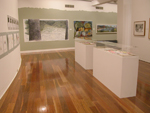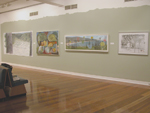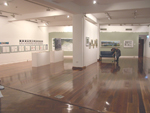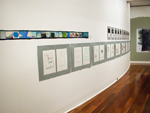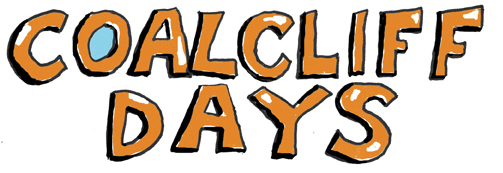
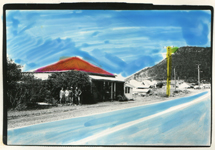
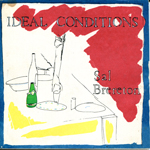


OVERVIEW
OF SHOW
The Coalcliff Days exhibition showcases the significant contribution to
both the Illawarra and Australian art scenes made by an artists and poets
“colony” located at Coalcliff from 1979 - 1992. The Coalcliff
site was established by Ken Bolton and Sal Brereton and was based in a
miner’s cottage perched on the cliff overlooking the ocean. This
local council sanctioned “squat” served as the site of a number
of seminal “post-modern” poetry, film and art projects. Sal
Brereton left in 1981 and Ken Bolton shortly afterwards. Alan Jefferies
then ran the house until 1992 when the council reclaimed the land and
bulldozed the house. Today there is no evidence of the Coalcliff spot
having existed other than a vacant block of overgrown scrub.
Between 1979 - 1992 many artists, poets, musicians and film-makers were
drawn to This Coalcliff house including:
Micky Allan, Ken Bolton, Sal Brereton, Kurt Brereton, Barbara Brooks,
Pam Brown, Erica Callan, Laurie Duggan, Denis Gallagher, Alan Jefferies,
Rae Desmond Jones, Steve Kelen, Kate Richards, Leigh Stokes and Tom Thompson.
A wide range of projects and publications were produced at Coalcliff including the influential new poetry magazine Magic Sam; as well as anthologies (No Regrets) locally screen-printed and produced poetry books including Sal Brereton’s Ideal Conditions, Ken Bolton’s Two Sestinas, Notes for Poems, Denis Gallagher’s Making Do and Pam Brown’s Small Blue View. Artist’s books included Kurt Brereton’s Hang-Gliding, We Are A Movie and Tyre-Pinch: The Cyclist’s Nightmare; Ken Bolton’s An Italian Drink, and the collaborative Xmas Corpses. A number of poetry readings were held in Wollongong; the film The Coalcliff by Kurt Brereton & Kate Richards (1981) and other super 8 home movies by Pam Brown and Kurt Brereton were shot at the time.
The exhibition focus is on the artworks, graphics, publications, films
and posters. Poetry readings and artist talks accompany the show. Recent
artworks have also been included to give an ongoing historical context
to the show.
Importantly, these historical events and productions from the Coalcliff
days have been told from the perspective of those people directly involved.
As such, the art has been placed in a ‘lived’ context within
the cultural history of the Illawarra. A second crucial objective of the
show is to continue the ethos of those artist-led initiatives by producing
a further publications featuring artwork, poems, films, historical essays
and biographical material on the protagonists and events that took place
over more than a decade.
Kurt Brereton (joint-curator)
Exhibition at Wollogong City Gallery April 9 - May 22, 2011
Opening April 15th
click on installation shots below to see larger size

